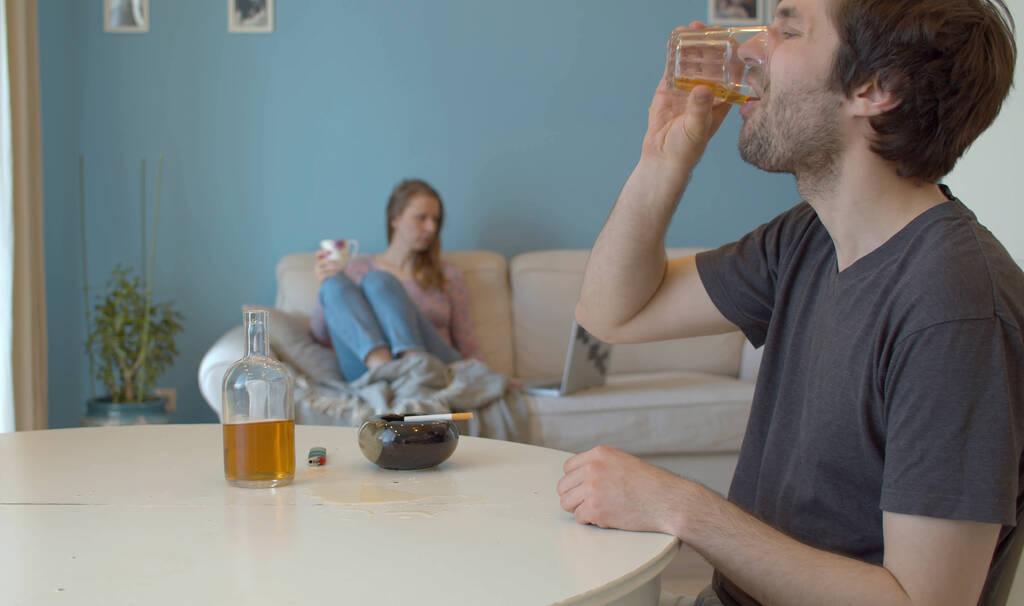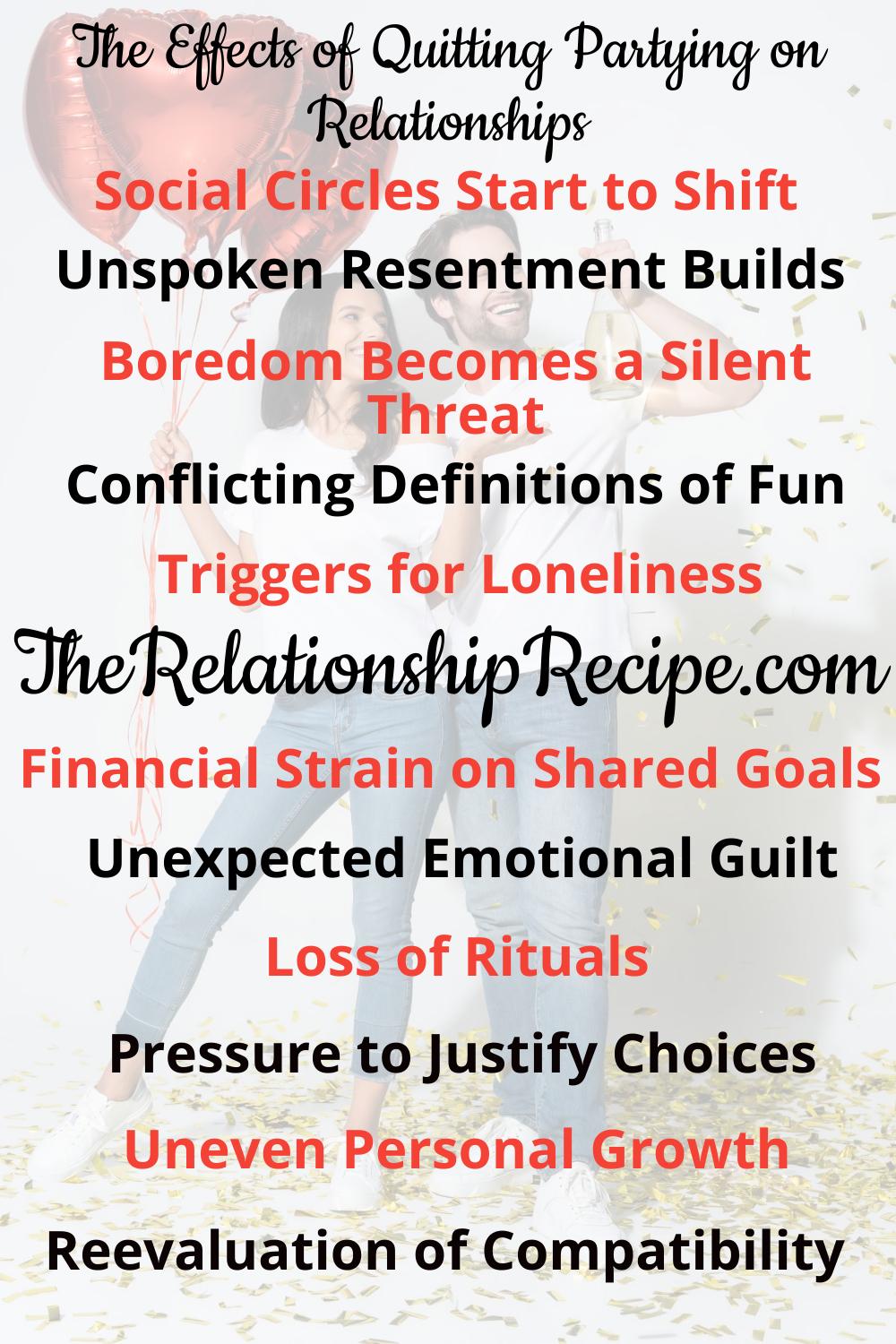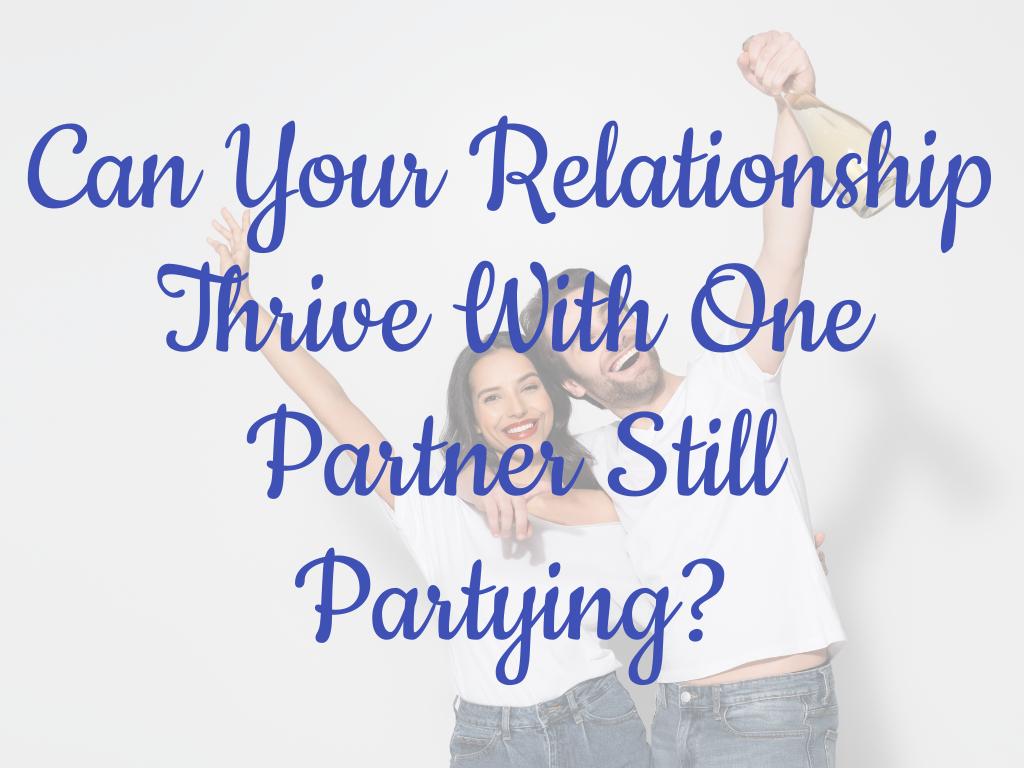When the Party Stops, Does Love Survive?
One day, the late nights, loud music, and endless rounds of drinks don’t appeal anymore. But what happens when you’re ready to trade the club for quiet nights, with your partner still partying? Can a relationship survive when one quits partying while the other doesn’t?
The decision to stop with a partner still partying can feel like a personal growth milestone, but its ripple effects hit your relationship hard.
If this dynamic feels familiar, and you are feeling the effects of your relationship struggles with partying, you’re in the right place. Oh, and congrats on putting your health and well being first!

In a previous article, I’ve been vulnerable, and touched on how my quitting partying / drinking has affected my relationship, connection, and our now non-existent sex life with a partner still partying.
It got the point where I no longer wanted to drink, but did so anyway, just to have some sort of connection – a common shared activity between us – even though it was unhealthy. Eventually, I had to choose myself and my peace over his preferences in our relationship.
Since I’ve stopped drinking, with my partner still partying, the canyon between us has only grown wider. I’m growing as a person, and he isn’t. I firmly believe his drinking habit has resulted in his emotional immaturity, anger issues, and lack of personal growth.
He drinks alone now.
He hasn’t grown much as a person, because his personal development likely stopped at the point when he started drinking. My growth stopped as well, but being sober for a little over a year has opened my eyes to how much of my own personal growth was still to come!
However, there are other issues within our relationship that are huge, as well. For the sake of simplicity, I’ll not veer off into how drinking causes other relationship issues, or contributes to the existing ones in a negative way.
This article will explore whether your relationship can survive when one quits partying, the effects of quitting partying on relationships, uncover the hidden challenges that arise, and give you practical strategies to stay connected—even when your lifestyles clash.
What You’ll Gain:
- Insights into why quitting partying shakes up relationships.
- The emotional and social effects of quitting partying on relationships.
- Expert-backed strategies to navigate relationship struggles with partying and move forward together.

Why Quitting Partying Feels So Personal
When one person in a relationship quits partying, the change goes far beyond personal choice. Partying often plays a significant role in how couples connect, unwind, and share social experiences. Giving it up can feel like losing a shared identity, leaving the other person unsure how to fill that gap.
For the partner still partying, it might feel like judgment or rejection. They may think, “Am I not good enough? Am I holding them back?” Meanwhile, the one quitting might feel isolated, wondering, “Why don’t they want to grow with me?”
Key Insight:
Quitting partying doesn’t just remove an activity; it disrupts how you’ve built your bond.

The Effects of Quitting Partying on Relationships
- Social Circles Start to Shift
When you stop partying, shared friend groups may fade. People who once bonded over cocktails and dance floors may not understand your decision. This creates tension when your partner wants to continue engaging with those groups. - Unspoken Resentment Builds
The partner still partying might feel forced to change against their will, even if no ultimatum exists. Resentment creeps in when one person feels the other is growing away instead of with them. - Boredom Becomes a Silent Threat
When your connection relied heavily on partying, losing that shared activity might leave a void. Without new, intentional efforts to reconnect, boredom can drive you further apart. - Conflicting Definitions of Fun
Quitting partying can expose deeper differences in what each partner considers enjoyable. The person who stopped may prefer quieter, more introspective activities, while the other might still find energy and connection in high-energy environments. This divergence can leave both feeling misunderstood or unsupported. - Triggers for Loneliness
The partner who quit may feel isolated when their significant other continues to attend parties. Watching someone maintain the lifestyle you left behind can amplify feelings of loneliness, especially if the partying seems to highlight how much your lives have diverged. - Financial Strain on Shared Goals
Partying often comes with a price tag. When one partner saves money by staying in, but the other continues spending on nights out, it can create financial tension. This often goes unspoken but contributes to frustration over misaligned priorities. - Unexpected Emotional Guilt
The person quitting might feel guilty for “changing the rules” mid-relationship, worrying that their decision adds stress or disappointment to their partner’s life. Meanwhile, the partner still partying might feel guilty for not wanting to follow suit. - Loss of Rituals
Many couples establish small rituals around partying, such as a favorite pre-drink spot or post-party meal. Losing these rituals can feel like losing tiny but important moments that kept you connected. - Pressure to Justify Choices
The person who quits partying might feel constant pressure to explain their choice to both their partner and their social circle. This can cause emotional exhaustion, especially if they don’t feel fully supported. - Uneven Personal Growth
Quitting partying often leads to introspection, healthier habits, and personal growth. If one partner evolves significantly while the other remains in their old ways, it can create a sense of emotional or intellectual imbalance. The person growing might feel held back, while the other may feel left behind. - Reevaluation of Compatibility
Stopping partying often reveals whether the relationship was built on a deeper connection or the shared thrill of social activities. If deeper compatibility isn’t there, the shift can act as a wake-up call.

Tips to Help Your Relationship Survive When One Quits Partying
1. Reinvent Shared Fun
Explore new hobbies that excite both of you, such as hiking, cooking classes, or weekend trips. Finding activities outside of partying builds a new foundation for your connection.
2. Set Clear Boundaries
Discuss how you’ll handle invitations to parties or nights out. Setting expectations upfront avoids misunderstandings and helps both partners feel respected.
3. Focus on Communication
Be honest about your feelings without placing blame. For example, say, “I miss spending time together on weekends” instead of “You’re always partying without me.”
4. Find a Middle Ground
Consider compromise activities, such as attending a dinner party but leaving before the late-night drinking starts. This allows both lifestyles to coexist without friction.
5. Invest in Couple’s Therapy
A neutral space can help you both navigate lifestyle differences, especially if the transition feels overwhelming.

Building New Bonds After Quitting Partying
The effects of quitting partying on relationships don’t have to create distance. Instead, they can open the door to fresh ways of connecting and deepening your bond. Here’s how to intentionally rebuild your relationship foundation.
Replace Old Habits with Shared Adventures
Transitioning from party nights to quieter activities doesn’t mean losing fun. It means finding new ways to connect:
- Swap the dance floor for creativity: Take a painting class, attend a live theater show, or try escape rooms for an engaging challenge.
- Trade the bar for brunch: Weekend mornings can transform into your new favorite tradition, filled with coffee runs, farmer’s markets, or yoga dates.
- Explore uncharted hobbies together: Pick activities neither of you has tried before, like paddleboarding or pottery, to build excitement and teamwork.
Establish Healthy Boundaries and Individual Spaces
It’s natural if your partner still enjoys occasional nights out. Allowing space for their preferences while maintaining your boundaries fosters mutual respect.
- Set agreements: Discuss how often your partner plans to party and decide what feels reasonable for both of you.
- Rediscover yourself: Use their party nights as an opportunity to reconnect with your passions and hobbies outside the relationship.
This balance prevents resentment and helps both of you feel fulfilled.
Build a New, Supportive Social Circle
One of the significant relationship struggles with partying is losing connections tied to that lifestyle. But it’s possible to find a fresh social network that aligns with your values.
- Seek like-minded friends: Join groups, clubs, or meetups based on shared interests or sobriety.
- Involve your partner in activities: Hosting game nights or group hikes can introduce your partner to your new social world without pressure.
Surrounding yourselves with supportive people can reduce the tension around differing lifestyles.
When you embrace these strategies, your relationship can thrive despite lifestyle changes. The key is recognizing that the effects of quitting partying on relationships don’t have to create distance—they can build a stronger, more intentional bond.

FAQs: Effects of Quitting Partying on Relationships
What are the emotional effects of quitting partying on relationships?
Quitting partying can trigger feelings of isolation, misalignment, and frustration. Couples must address these emotions openly to avoid long-term disconnect.
How do relationship struggles with partying manifest?
Partners often clash over mismatched social priorities, feeling left out, or misinterpreting lifestyle changes as criticism of their choices.
What are the effects of quitting partying on relationships?
Quitting partying can affect social circles, personal growth, and shared rituals, creating challenges like emotional distance or financial strain in relationships.
How can your relationship survive when one quits partying?
Focus on reinventing shared activities, setting boundaries, and maintaining open communication. Balance is key to navigating this lifestyle shift.
Why do relationships struggle with partying differences?
Relationships struggle because partying habits influence social connections, values, and personal goals. Differing lifestyles can create tension without mutual understanding.
How does quitting partying change social circles?
Social circles often shift as shared activities fade, leading to fewer mutual friends and feelings of exclusion
Does quitting partying lead to breakups?
Not necessarily. Breakups happen when couples fail to adapt, not because of lifestyle changes.
What’s the biggest mistake couples make during this transition?
Assuming the other person automatically understands your needs. Lack of communication is the top reason relationships struggle during lifestyle shifts.
How can I keep my relationship fun after quitting partying?
Introduce new activities like traveling, trying cooking classes, or hosting game nights. Fun isn’t tied to partying—it’s about shared experiences.
What if my partner refuses to adjust?
Discuss your long-term goals and whether your visions align. If your partner remains resistant, seek counseling to unpack deeper issues.

The Bigger Picture: How Growth Strengthens Relationships
While quitting partying can feel like a dividing line, it can also be a turning point for deeper intimacy. Growth challenges both partners to reflect on their priorities and reevaluate what they want from the relationship.
If you’re both committed to understanding and evolving together, your relationship can survive when one quits partying—and come out stronger.
Final Tip:
Keep the conversation going. As your lifestyles evolve, regular check-ins ensure you stay aligned and avoid misunderstandings. With mutual effort, love can thrive—even when the party ends.
Related post: How to Protect Yourself from an Angry Drunk
This post may contain affiliate links. I earn from qualifying Amazon purchases at no extra cost to you.





